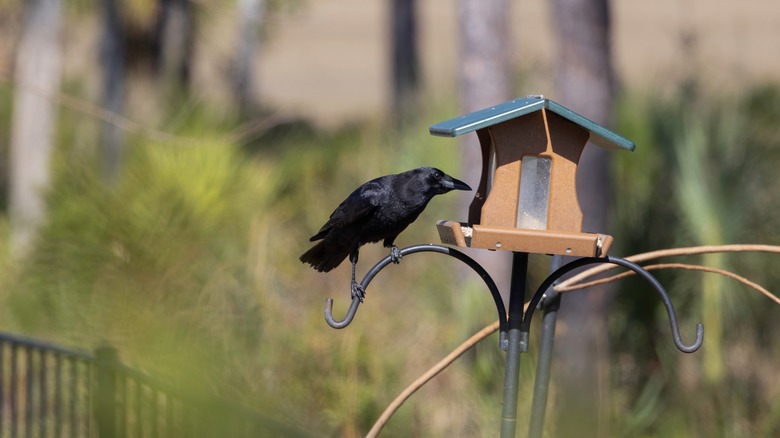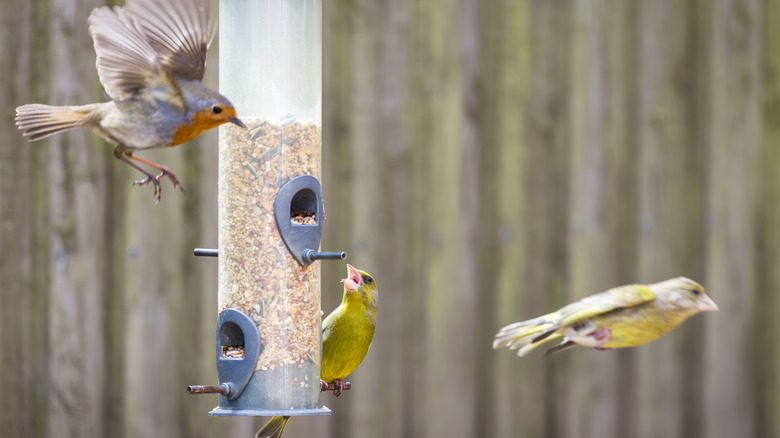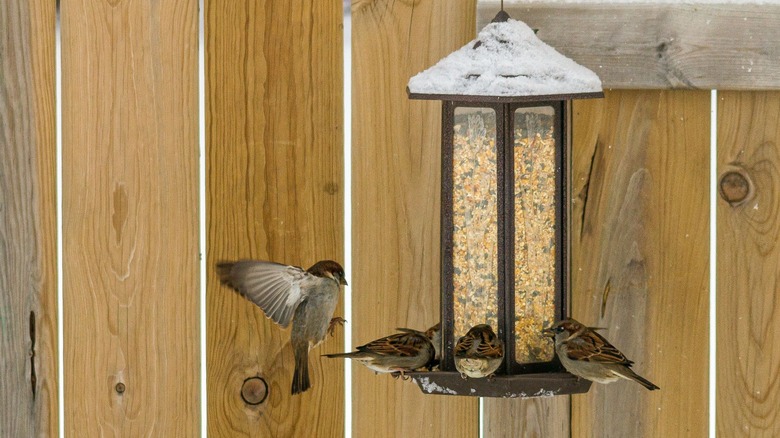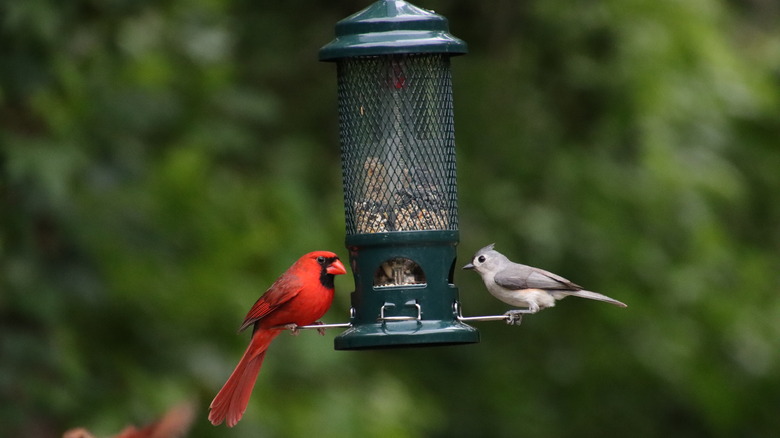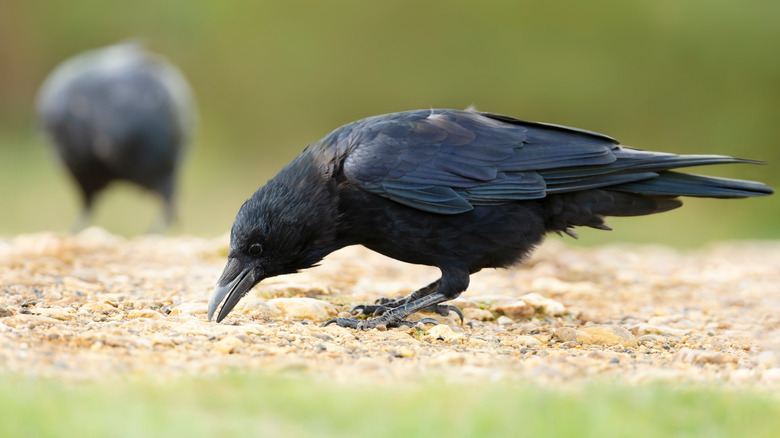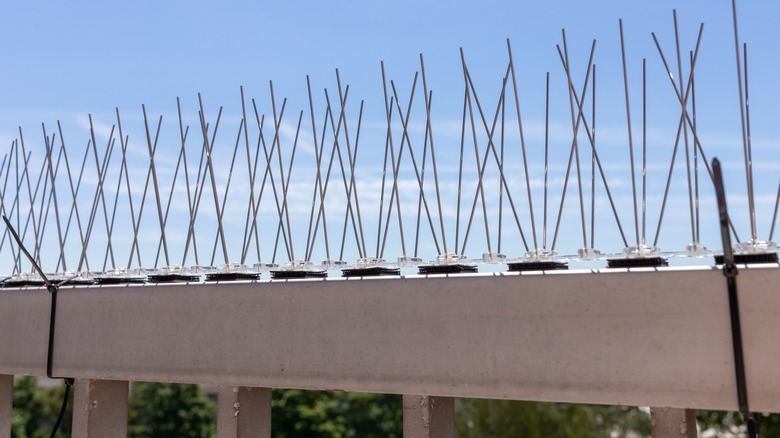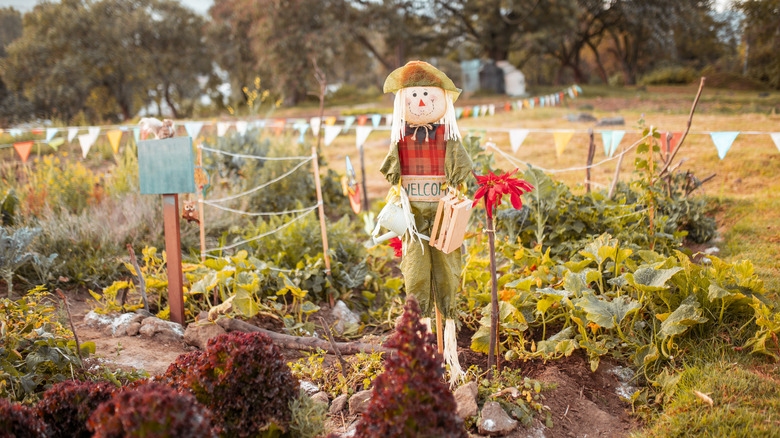Try These Tricks To Keep Crows Away From Your Bird Feeder
Crows are among some of nature's most fascinating birds, due to their intelligence and social habits. However, crows can also become quite a nuisance for farmers, gardeners, and small bird enthusiasts. The National Audubon Society even declares crows to be "opportunistic" birds, as they are known to surround new food sources and destroy other items in their path. In fact, crows can be just as damaging in both rural and urban areas, from farmlands and gardens to small patios and trash cans. As crows seek out food, they can scare small birds. Even worse, they are also known to feed on other birds' eggs.
This can all mean trouble if you have a bird feeder for small songbirds and notice crows lurking around your home. However, you don't have to get rid of bird feeders for your beloved songbirds, along with all the benefits that having a bird feeder can offer. Instead, you can try a few tricks to help deter crows away from the spaces other birds enjoy.
Use bird feeders that are too small for crows
If you're having issues with crows flying directly to bird feeders and bullying songbirds away from their food, you might consider swapping out your current feeder for one that repels crows. Choosing a bird feeder that is too small for crows but still manageable for smaller songbirds can help fix this problem. This includes both the size as well as the weight of the feeder. A smaller feeder may hold less seed, but it will also be difficult for a crow to land on and steal food from other birds.
When shopping around for a bird feeder, choose one that specifically helps to deter crows. Usually, a smaller feeder or one with small cages or a dome-shaped top, is appropriate. One that advertises prevention against squirrels may also help deter larger birds in the same ways it repels squirrels. Additionally, consider changing the location of your bird feeders periodically so crows won't automatically know where to find them. A common concern, of course, is that songbirds might also be kept guessing about where to find their food. However, rest assured that it won't take long for small birds to find their feeders again.
Make crows feel uneasy by placing a fence around your bird feeder
Aside from investing in a crow-repellant bird feeder, you can also consider building a fence around it. The idea here is to keep large birds out, while still allowing room for small songbirds to fit in between the fence panels. While both small birds and crows alike may be able to fly over fencing, the idea here is to reduce the amount of open space that crows normally prefer to hang out in. By narrowing down open spaces surrounding your bird feeder, you will create discomfort for crows lurking nearby, and possibly discourage them from entering the area.
If you're interested in creating this type of barrier, consider a DIY garden fence that can help keep crows and other unwelcome wildlife away from bird feeders. This involves wooden posts along with netting to deter crows. Alternatively, you can also use a small wire cage around hanging feeders to help allow small songbirds inside only.
Shorten perches to deter crows from bird feeders
Bird feeders come in a variety of sizes and styles that can help deter crows while still allowing small songbirds access to food. If you're trying to keep crows away, you might also consider making other features of your feeder, like the perches, hostile to crows. Small perches allow little songbirds to stand while they eat from the feeder. However, if a perch is too large, it can attract unwanted species like crows.
The key here is to make perches around your feeders less desirable for crows to land on. You can shorten perches directly on the feeders or any hooks they're hanging from by sawing them down or using bolt cutters. If you're unsure about how much to cut, consider shortening the perches by half to start, and then observe whether these are too short for crows to land on. Balance is important here, as you don't want to shorten the perches so much that small birds can't land on them, either.
Clean up all sources of food from the ground to deter crows
Crows are infamous for seizing any food opportunity, so it's important to help clean up any food items off the ground to help deter these birds from your yard or garden. If fewer food sources exist, the crows will be less likely to hang around and target your bird feeder. Common items that attract crows include trash, compost, pet food, and of course, bird seed.
While you can't stop songbirds from making a mess around bird feeders, you can help clean up underneath the feeders every night. It's also best to keep bags of bird food in sealed containers inside your home, rather than leaving them for prying birds and rodents outdoors. If you have pets, be sure that all food is kept indoors and that any bowls they feed from outside are brought back in at the end of the day. Securing trash cans can also help deter crows from picking through loose garbage. Finally, if you have edible plants in your garden, use plant netting for protection against crows.
Use bird spikes to discourage crows from roosting around your yard
You can also prevent crows from hanging around on fences, roofs, and ledges with the help of bird spikes. Bird spikes won't harm crows, but instead act as visual deterrents they know they can't land on. In turn, these stainless steel spikes help to discourage crows and other large birds from roosting around the perimeter of your home and yard. If they are unable to hang out near your yard, crows are less likely to congregate by bird feeders.
To install bird spikes as a way to keep birds from around your house, you can attach them with either small screws or adhesive, depending on the brand instructions. The spikes may be affixed to virtually any flat surface, especially near bird feeders. Keep in mind that these won't harm songbirds that use your feeders, as they are small enough to slip in between bird spikes. The greatest downside is the lack of aesthetic appeal, as these bird spikes resemble large porcupine-like needles. However, these can be an effective method of discouraging roosting crows, which can be a sensible trade-off to protect your songbirds and their food sources.
Hang shiny objects in your yard to keep crows away
Aside from stainless steel spikes, crows also dislike shiny, reflective objects. Among these include mirrors, foil, and mylar tape. These visual deterrents work by startling crows as they enter your yard space, which can then make them more hesitant to try to get food from your garden and any bird feeders you have. Better yet, if these shiny objects get caught up in a breeze, it can become even more confusing for crows who will likely steer clear of the area.
You don't necessarily have to buy anything special to try this trick. Consider hanging up small mirrors to scare off crows, or use old CDs or mylar streamers and balloons around your yard. Aluminum foil and aluminum windchimes can also scare crows away. Try mixing up the routine by refreshing the deterrents or occasionally moving them to different spots. This could keep crows guessing before they have a chance to figure out that these shiny objects are not actually harmful.
Consider an old-fashioned technique to scare away crows
If you've ever seen a scarecrow in a farm and have wondered whether it actually works, the answer is: yes, but with a few caveats. You can consider adding a scarecrow in your garden to intimidate crows that may be lurking nearby. Installing a scarecrow may help keep away crows. You might also try other stand-ins that resemble their predators, such as fake hawks or owls.
However, scarecrows may be a temporary measure only, as these intelligent birds will get used to the decoys after a while. You can still use a scarecrow, but avoid leaving it out in the same place. Consider moving the scarecrow around every couple of days to keep the crows on their feet. You may even be able to mix up your scarecrow by donning it with different outfits or hats. Scarecrows tend to be more effective when they're used in combination with other crow-deterring techniques.
